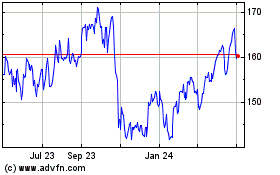By Bradley Olson
Chevron Corp. said in a new report that a global transition to
lower-carbon energy sources poses a minimal risk to its operations,
a response that follows growing shareholder demand for more
disclosure on climate risks.
Dramatic global action to limit the effects of warming
temperatures wouldn't harm Chevron's assets because the oil giant
is investing in lower-cost opportunities, according to the report,
which was quietly posted on the company's website Wednesday
evening. Such a scenario could render costlier projects
uncompetitive, the company said.
"We understand the concerns out there," Chevron Chief Executive
John Watson said Wednesday in an interview, adding that the company
felt a need to be responsive to shareholders.
Last year, a shareholder resolution pushing Chevron to examine
what the specific impacts would be on its operations in the event
of a major, concerted effort to curb global emissions garnered
about 40% of votes cast. The ballot measure for a so-called
"climate stress test" prompted Chevron, the second-largest U.S. oil
company, to produce a report detailing its views on "climate
risk."
Mr. Watson, a vocal proponent of free trade and free markets who
opposes a carbon tax, said Wednesday that he was uncertain that
some proposed interventions to respond to climate change will be
effective. He questioned who will pay for some developing countries
to reduce emissions as outlined in a global climate pact made in
Paris in 2015.
"I'm interested in policies that are going to be effective," he
said. "I just don't think some of the things we're doing are going
to work."
The push for Chevron to make such a climate assessment, which
the company resisted last year, comes as some global energy leaders
have voiced skepticism this week about whether oil demand will soon
peak and threaten the viability of future drilling prospects.
In a public appearance Wednesday at the annual CERAWeek
conference in Houston, Mr. Watson said such forecasts represent
"wishful thinking." Energy demand will remain robust because
billions of people around the world will in time enter the middle
class, he said.
Concerns that demand will peak are misguided, Khalid al-Falih,
Saudi Arabia's energy minister, said Tuesday. Such a discussion
could discourage "trillions of dollars of investment" that will be
needed to meet supply needs in the coming decades. Other chief
executives such as Hess Corp.'s John Hess made similar
comments.
Such views, however, weren't universal at the gathering. Ashok
Belani, the executive vice president for technology at oil-services
giant Schlumberger Ltd., said Monday that the rate of adoption of
electric car use could "surprise to the upside."
"It is definitely going to affect our lives," he said. "It's
obviously a phenomenon worth watching."
Some large oil and gas companies are taking a more progressive
approach to the potential impact of climate change on their
business.
In a report published Thursday, Norway's Statoil set a target
for carbon dioxide emissions reductions of 3 million tons a year by
2030. The company has already announced plans to shift around
15%-20% of its capital spending to renewables and other low carbon
alternatives to fossil fuels over the next decade.
Royal Dutch Shell PLC also announced plans on Thursday to bake
greenhouse gas management in its operations into its executive
remuneration policy.
In October, Shell's Finance Chief Simon Henry said the company
sees oil demand peaking in five to 15 years. The question is hotly
debated among energy producers, since many point to outside
forecasts such as that by the International Energy Agency that see
oil demand rising through 2040.
Chevron's conclusions that its assets aren't vulnerable to
climate reform efforts resemble the views of many industry players,
including Exxon Mobil Corp. In 2014, Exxon found that none of its
reserves "are now or will become stranded," or left untapped due to
new regulation or falling demand.
Even under an International Energy Agency scenario that imagines
energy use as it would unfold under tighter emissions constraints,
oil and natural gas will still meet 44% of global demand by 2040,
according to the report. Chevron noted that the Paris-based agency
also estimates that about 60% of the $44 trillion that will be
invested in energy supply through 2040 will go toward fossil
fuels.
Those analyses point to plentiful demand, the company said. If
global enforcement measures stemming from the Paris climate
agreement take hold, Chevron's internal process for evaluating
assets will allow them to avoid choosing any high-cost investments
that new regulations or changes in energy use would make
unprofitable.
Some companies that have produced reports on such risks have
acknowledged that drastic climate action would reduce profits.
Australian mining conglomerate BHP Billiton Ltd., which operates
extraction businesses in oil, gas and coal, in addition to other
commodities, said in 2015 that a "shock event" leading to rapid
emission reductions could bring about a modest reduction in
potential earnings by 2030.
On Wednesday, Mr. Watson expressed frustration that energy
companies and investors or activists that are concerned about
climate impacts "are talking past each other," saying he doesn't
believe the different sides have begun a true dialogue about the
potential solutions to climate change and their likely costs and
trade-offs.
Write to Bradley Olson at Bradley.Olson@wsj.com
(END) Dow Jones Newswires
March 09, 2017 10:29 ET (15:29 GMT)
Copyright (c) 2017 Dow Jones & Company, Inc.
Chevron (NYSE:CVX)
Historical Stock Chart
From Mar 2024 to Apr 2024

Chevron (NYSE:CVX)
Historical Stock Chart
From Apr 2023 to Apr 2024
